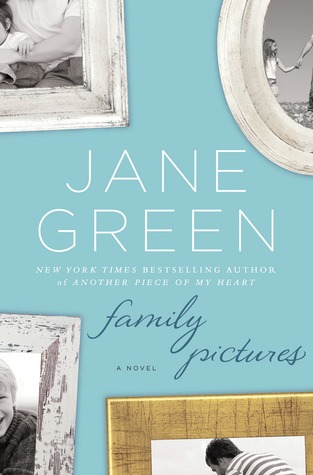Jane Green is one of the most talented women’s fiction writers today. Her work explores the emotional landscape of women and the complex lives they lead. Her latest, FAMILY PICTURES, is about the secrets we keep from others and those we keep from ourselves. It is about what happens when those secrets are exposed and how we pick up the pieces of our fragile lives and find strength in unexpected places. Bookfinds had the pleasure of interviewing Jane about her latest release.
Tell us the story behind the story. How did FAMILY PICTURES come to be?
There were a couple of inspirations. The first is the general theme of the constructs we create around who we are, and how we want other people to see us. I have long been fascinated by our inclination to assume others we meet have the same moral code, similar values, and yet we can never be sure. Then a couple I knew of ended up having their lives turned upside down after the husband was discovered to have another, hidden family on the opposite coast. It was far too good a story to not let it inspire me.
What was the most challenging aspect of writing FAMILY PICTURES?
This was the hardest book I have written, in every way. I took a year off to build our house, then became ill fand wasn’t able to write. By the time I sat down to write Family Pictures, I hadn’t written anything in almost two years, and writing, I have discovered, is a muscle: if it isn’t exercised, it will atrophy. I was on a lot of medication which didn’t help my concentration skills and ability to focus, and there were times I honestly didn’t know whether I would be able to finish the book. Eventually I had 120,000 words on the page, which was truly when the work started. I am enormously blessed in having an extraordinary editor who took my rather jumbled-up words and helped craft them into what you see today. It took one entire rewrite, plus five further extensive edits to get it into shape. The process was exhausting, but fascinating. I have learned so much about editing, the importance of it, and how a book can be transformed. I can honestly say that in terms of craft, this is technically the best book I have written.
What is the message you want readers to take away from your book?
Never to take anything at face value, to trust your instincts, and finally that you can find your family in the unlikeliest of places.
Describe your writing schedule. Do you outline? Any habits?
I write in the mornings once the kids have gone to school, taking my laptop and a coffee to a little writer’s room in town where I plant noise-cancelling headphones on my head and get to work. I am usually done by lunchtime, then back home to be mom. Twice a year I take myself off to a self-imposed ‘writer’s retreat’, staying at a small inn, or on a friend’s farm, where I am all alone and do nothing other than write.
What books are on your nightstand? What are you currently reading?
Carry on Warrior by Glennon Doyle Melton, Dark Tide by Elizabeth Haynes, Hello, Goodbye, Hello by Craig Brown, and Paris in Love by Eloisa James
Which authors inspire you?
At the moment I am obsessed with the idea of selling up and moving to France or Italy to renovate an old farmhouse. Of course this is only a pipe dream, but I am furiously lapping up any and everything that involves a memoir about someone having done the same thing. The current favorite is The Olive Farm by Carol Drinkwater.
What have you learned from this experience?
From the experience of being a writer? Probably that I am far more hermetic and complicated than I ever would have expected, and that you need a phD to succeed: persistence, humility, and discipline.
What is the best piece of advice you have ever been given?
Take care of your characters and they will tell their own stories.
What are you working on now?
I am just finishing a book about a woman in her forties going through a mid-life crisis. Married to a wonderful man, with two great kids, she isn’t unhappy, it’s just that life is a bit…dull. When a younger man starts paying attention to her, at first she responds, not because she would ever have an affair, but because it’s so lovely to be noticed, to feel alive again. But where do you draw the line, and is it possible to draw the line before it’s too late?

